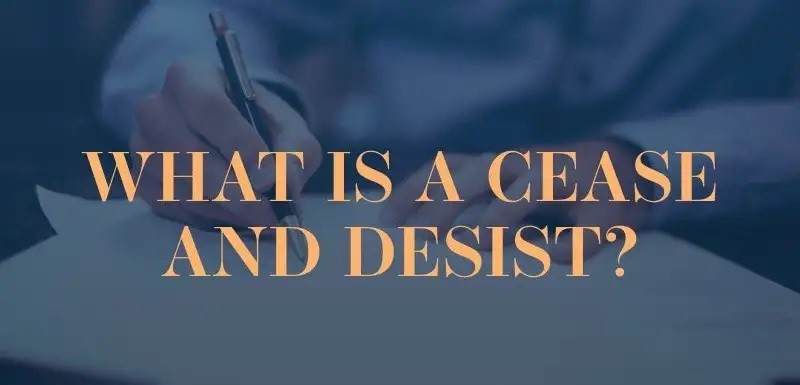A cease and desist letter is sent to immediately stop an individual or entity from continuing a specified unauthorized use or action. This is commonly the last resort before a lawsuit is filed.
WHAT ARE THE CONTENTS OF A CEASE AND DESIST LETTER?
The letter should reveal the grounds of the claim as well as the right of the infringing party’s to cure the issue.
A response from the recipient is required within a set time frame to acknowledge or refute the claims.
If the infringing party thereafter continues the unauthorized use or actions stated in the cease and desist letter, the complainant may file a lawsuit in the court of proper jurisdiction to enforce his/her claim.
TYPES OF CEASE AND DESIST LETTERS
- Breach of ContractCease and Desist – sent to a party that is in non-compliance with a valid agreement.
- Copyright InfringementCease and Desist – used by the person whose copyright is infringed to inform an individual or entity of their unauthorized use of copyrighted material.
- Debt Collector (Creditor)Cease and Desist – used by a debtor to Inform a creditor to halt all forms of communication to the debtor, primarily over the phone, in regards to a debt that is owed.
- Defamation (Slander)Cease and Desist – used by the person or entity whose name has been purposefully harmed to the person initiating the defamation/slander claims to cease his/her actions.
- HarassmentCease and Desist – this is the first step against inappropriate behavior (e.g. sexual comments, personal attacks, emotional abuse, etc.) and serves as a last warning before legal action is taken.
- Intellectual PropertyCease and Desist – used for any type of proprietary information that is being used or was taken without the authorization of its owner.
- Non-DisclosureViolation Cease and Desist – used in cases of a breach of an Non-Disclosure Agreement (NDA) to halt any further violation by the party in breach before legal action is taken.
- Responseto Cease and Desist – used by a party who has received a cease and desist letter to respond to the claims made against them in the letter.
- Trademark InfringementCease and Desist – used to give official notice to a third party infringing on a registered trademark that is not under their ownership.
DOES A CEASE AND DESIST LETTER CARRY LEGAL WEIGHT?
A cease and desist letter carries legal weight and has legal consequences in case of breach or continued infringement as it has the same effect as an injunction or restraining order though the consequences may be different. Failure to comply with the legal terms outlined in the letter can result in legal ramifications for the violating party.
WHAT HAPPENS WHEN ONE DOES NOT COMPLY WITH THE CEASE AND DESIST LETTER?
- The complainant or affected party may get relief in form of fines or other injunctive relief
- The complainant can sue for breach contract
- The complainant may apply for a warrant of arrest for the offending party for contempt of court where the cease and desist is ordered by the court
- The party receiving the cease and desist letter risks potential jail or prison time for non-compliance with the cease and desist letter.
Conclusion
If you have a dispute that requires legal intervention, you should consider sending the infringing party a cease and desist letter. At Netsheria International, we have an experienced team of lawyers who can offer you legal assistance in drafting and framing of the claims and issues in the cease and desist letter. Further, we can advise on the legal recourse to take where the infringing party fails to honor the cease and desist letter. For more information, you can go to our website www.netsheria.com


